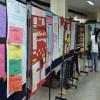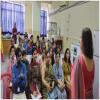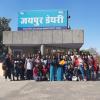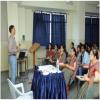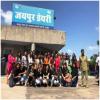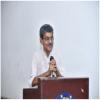Workshop under DBT-FOLDSCOPE promotional drive on 13th August 2019
A group of 23 students, all from classes VI to XII; accompanied by 7 school faculties, visited Research and Development Cell of IIS (Deemed to be University), Jaipur on August 13, 2019 under DBT-FOLDSCOPE promotional drive. The Department of Biotechnology at IISU has organized a small workshop along with visit to other department laboratories to encourage budding enthusiasm among the students.
The session commented with welcome address by Dr. Radhika Sharma, Head, Department of Biotechnology, IISU, Jaipur. Dr Ameeta Sharma then introduced the students with the basics of microbial culture and Gram staining. The lecture was very enlightening and received lots of applauds from the visiting fraternity.
Dr. Nidhi Gupta, then told them about assembly of FOLDSCOPE, other light microscopes and inverted microscopes. The students were then taught about process of culturing and Gram staining of E. coli microbial cells with the help of Ms. ParikshanaMathur, Ms. MonishaSinghal, Ms. Priyanka Yadav and Ms. Itisha Paul.
School students have a great time in visualizing the slides which they prepared with the help of research scholars in the lab. Dr. Nidhi Gupta then gave them a visit to Animal Cell Culture laboratory which had sparked their enthusiasm for Biology.
The students were then allowed to visit laboratories of Department of Journalism and Mass Communication where Dr. Garima was very kind to answer their queries. On their visit to Chemistry Laboratory, Dr. Varsha welcomed them and entertained all their questions. Later on when they visited Department of Visual Arts, they all were mesmerized with the beauty our students had depicted in the forms of paintings and sculptures.
Dr. Nidhi Gupta from IISU and faculties of RamjasSchool, then discussed about various uses of FOLDSCOPE and how can that be beneficial for Science students. We were of the opinion that common people have been shown the beauty of nature much closely with the aid of FOLDSCOPE. Overall, it was a very fruitful gathering and discussion on behalf of Ramjas School, New Delhi and IIS (Deemed to be University), Jaipur.
The school students were also briefed about the various facility our University has such as Animal House, Plant Tissue Culture lab, Audio Visual Lab, CIT lab etc. They were very happy and satisfied with the hospitality we have shown.
IISU visit by students of Ramjas School, R.K. Purum, New Delhi; scheduled for August 13, 2019 at 10:30 am onwards
Notice
Gallery


